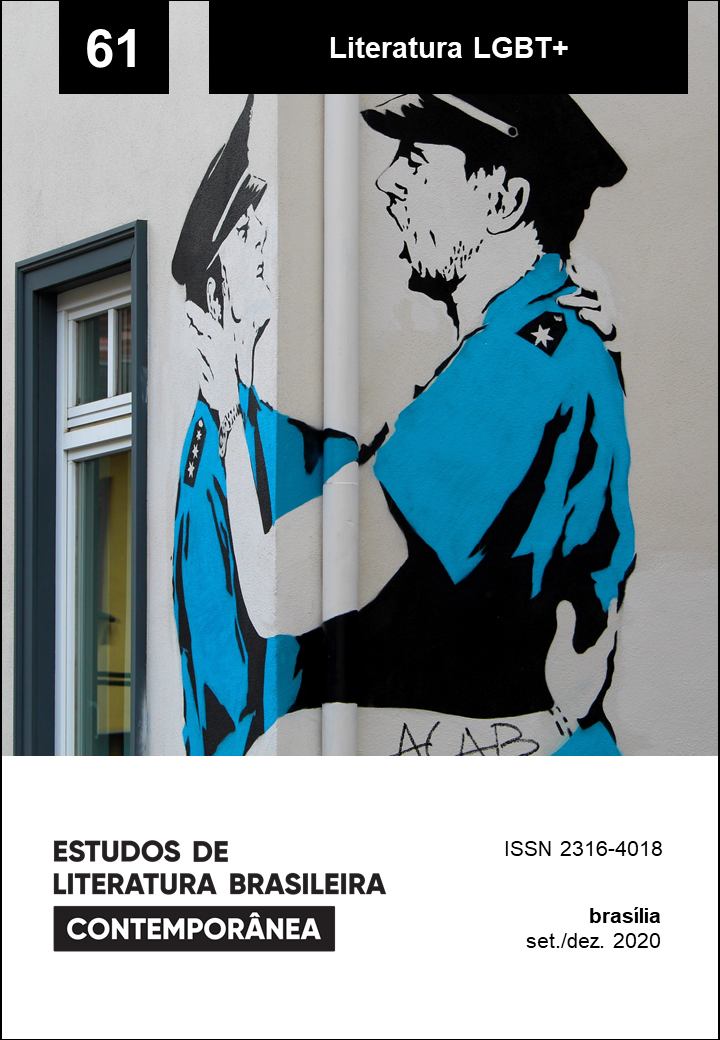State and Gender Violence in Three Short Stories by Bernardo Kucinski
DOI:
https://doi.org/10.1590/2316-40186116Keywords:
contemporary literature, literature and violence, literature and historyAbstract
This paper aims to analyze the short stories “Sobre a natureza do homem”, “Você vai voltar pra mim” and “Recordações do casarão”, published in Você vai voltar pra mim (2014a), by Bernardo Kucinski. The texts narrate events which occurred during the Brazilian military dictatorship, and this study hypothesizes that the plots contain an entanglement between state violence and gender-based violence. The interpretation is based on the perception that Kucinski’s short stories are manifestations of testimonial literature, that is, they establish a connection between historical context and literary content. From this perspective, it is possible to understand that, during the dictatorship in Brazil, the violence had a patriarchal face, and that literature is a powerful way to criticize the barbarism.
Downloads
References
ARNS, Dom Paulo Evaristo (Org.) (1985). Brasil: nunca mais. Petrópolis, Rio de Janeiro: Editora Vozes.
BOURDIEU, Pierre (2014). A dominação masculina. Tradução de Maria Helena Kühner. Rio de Janeiro: BestBolso.
DAS, Veena (2007). Language and body. In: DAS, Veena. Life and words: violence and the descent into the ordinary. Califórnia: University of California Press. p. 38-58.
GASPARI, Elio (2011). A ditadura escancarada. São Paulo: Companhia das letras.
GINZBURG, Jaime (2012). Linguagem e trauma na escrita do testemunho. In: GINZBURG, Jaime. Crítica em tempos de violência. São Paulo: Edusp. p. 51-60.
GINZBURG, Jaime (2013). Literatura, violência e melancolia. Campinas: Autores associados.
KEHL, Maria Rita (2010). Tortura e sintoma social. In: TELES, Edson; SAFATLE, Vladimir (Org.). O que resta da ditadura: a exceção brasileira. São Paulo: Boitempo. p. 123-132.
KUCINSKI, Bernardo (2014a). Você vai voltar pra mim e outros contos. São Paulo: Cosac Naify.
KUCINSKI, Bernardo (2014b). Você vai voltar pra mim. In: KUCINSKI, Bernardo. Você vai voltar pra mim e outros contos. São Paulo: Cosac Naify. p. 69-71.
KUCINSKI, Bernardo (2014c). Sobre a natureza do homem. In: KUCINSKI, Bernardo. Você vai voltar pra mim e outros contos. São Paulo: Cosac Naify. p. 43-56.
KUCINSKI, Bernardo (2014d). Recordações do casarão. In: KUCINSKI, Bernardo. Você vai voltar pra mim e outros contos. São Paulo: Cosac Naify. p. 111-125.
KUCINSKI, Bernardo (2014e). K. Relato de uma busca. São Paulo: Cosac Naify.
MARCO, Valeria de (2004). A literatura de testemunho e a violência de Estado. Lua Nova, São Paulo, n. 62, p. 45-68. Disponível em: https://bit.ly/330cNZS. Acesso em: 29 jul. 2014.
MICHAEL, Joachim (2017). Memória do desaparecimento: a ditadura no romance K. Relato de uma busca, de Bernardo Kucinski. Revista Teresa, São Paulo, n. 17, p. 15-30, abr. Disponível em: https://bit.ly/3lXhe01. Acesso em: 9 jul. 2017.
SCHMIDT, Rita Terezinha (2017). Entrevista concedida a Jaime Ginzburg em 2 de maio de 2016. Revista Teresa, São Paulo, n. 17, p. 251-264, abr. Disponível em: https://bit.ly/3jRT7OE. Acesso em: 9 jul. 2017.
VIEIRA, Beatriz de Moraes (2010). As ciladas do trauma: considerações sobre história e poesia nos anos 1970. In: TELES, Edson; SAFATLE, Vladimir (Org.). O que resta da ditadura: a exceção brasileira. São Paulo: Boitempo. p. 151-176.
Downloads
Published
How to Cite
Issue
Section
License
Copyright (c) 2020 Leandra Postay

This work is licensed under a Creative Commons Attribution-NoDerivatives 4.0 International License.
Authors who publish in this journal agree to the following terms:
a) The authors maintain the copyright and grant the journal the right of first publication, the work being simultaneously licensed under the Creative Commons Attribution License-Non Commercial 4.0 which allows the sharing of the work with acknowledgment of the authorship of the work and publication this journal.
b) Authors are authorized to enter into additional contracts separately, for non-exclusive distribution of the version of the work published in this journal (eg publish in institutional repository or as a book chapter), with authorship recognition and publication in this journal.
c) Authors are allowed and encouraged to publish and distribute their work online (eg in institutional repositories or on their personal page) after the editorial process, as this can generate productive changes, as well as increase the impact and citation of published work (See The Effect of Free Access).
d) The authors of the approved works authorize the magazine to, after publication, transfer its content for reproduction in content crawlers, virtual libraries and the like.
e) The authors assume that the texts submitted to the publication are of their original creation, being fully responsible for their content in the event of possible opposition by third parties.


